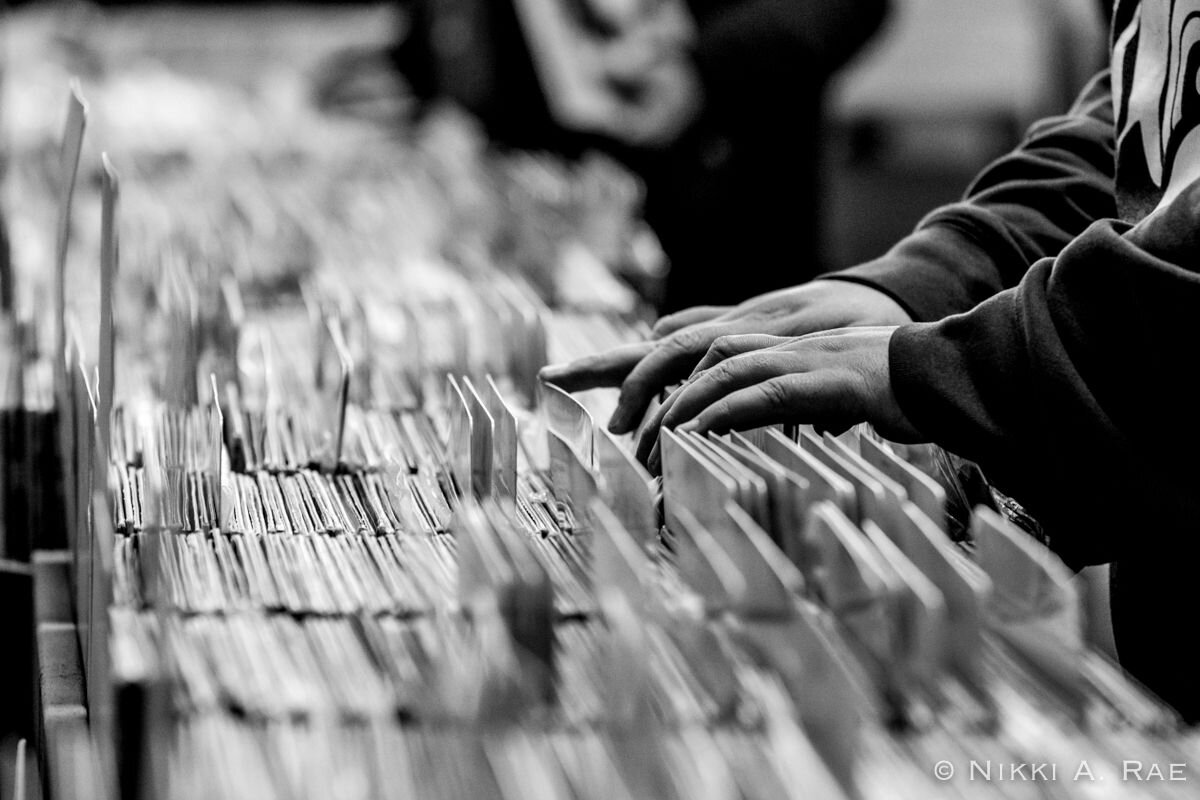Complaining v Moaning: An Uncomfortable Experience at Downtown Records
Picture by Nikki A. Rae at Record Store Day 2016
On most Saturdays of my youth I would take the bus into Romford Town Centre. I’d look around WH Smith and check out the stationery, books and board games; perhaps inspect the latest fashion at Mr Byrites; pause for a while by the concrete cubist fountain at the centre of the precinct; take in the bustle of the fruit and veg market. And I’d always pop into Downtown Records.
Downtown provided the only suggestion of counter-culture in Romford’s bland and boring consumerist world. It was a timeless melting pot of punk and soul, rock and prog. It was a magnet for outsiders. It was here that I learned to stand at the racks flicking through the plastic-wrapped sleeves in quick tempo. It was here that I mastered how to decode a record’s content by means of art direction, typography, session players and song titles. It was here that I plotted my own particular path through popular music.
Of course, I never felt entirely comfortable. I was too much of an awkward geek for that. And however essential the album I handed over to the biker-jacketed assistant - ‘Hot Buttered Soul’, ‘After the Goldrush,’ ‘Crocodiles’ - he always remained aloof, impassive, indifferent.
But still I felt at the centre of the world.
A common concern in the late ‘70s and early ‘80s was warped or scratched LPs. It was like corked wine, and became even more of an issue when they started importing cheaper, thinner vinyl from Portugal. I particularly recall my disappointment when my new copy of the Shalamar ‘Friends’ album fell foul of this problem: the needle could barely stay in the grooves as it rode the topsy-turvy disc. ‘Gonna make this a night to remem…ber!’
The following Saturday I returned to the store with the offending LP still in its red and white Downtown plastic bag – just to reinforce the fact that I’d purchased it from them. (The bag had a graphic of a woman with permed hair, which even then seemed anachronistic.) I marched uneasily to the desk at the back, without pausing to check out the latest releases - heart pumping, nerves jangling. I handed over the disc to the hirsute assistant.
‘I bought this record from you last week and I’m afraid it’s warped.’
He was singularly unimpressed and stared me straight in the eye.
‘Really?’
He nonchalantly slipped the vinyl out of its sleeve to see if I was telling the truth. I felt small minded, rude, petty and ungrateful; a time waster, an irritating annoyance, an ersatz music fan. I realised the crushing truth: it’s so uncool to complain.
Of course, I left with a new record. But it took me the whole of the bus-ride home to get over the experience, and I waited a couple of weeks before I returned to Downtown.
I have never been comfortable complaining. Complaining is awkward and confrontational. It conflicts with my natural instinct to make the most of things, to look on the bright side, to be optimistic.
And yet I’m well aware that complaining is an important cog in the wheels of capitalism. It holds businesses to account, it encourages improvement, it serves the interests of other customers. Sometimes complaining is just the right thing to do.
I recently came across this quote from John Lanchester, writing in The New Yorker.
'Visitors to Britain are rarely able to grasp – sometimes after decades of residency – the vital distinction its inhabitants make between complaining and moaning. The two activities seem similar, but there is a profound philosophical and practical difference. To complain about something is to express dissatisfaction to someone whom you hold responsible for an unsatisfactory state of affairs; to moan is to express the same thing to someone other than the person responsible. The British are powerfully embarrassed by complaining, and experience an almost physical recoil from people who do it in public. They do love to moan though.'
It’s true. Despite my deeply felt aversion to complaining, I am partial to a bit of moaning: about people that eat on the tube or rustle in the theatre; about entitled posh folk who push into queues and say ‘guys’; about autotune and cursing; about the music in the restaurant being too loud and the voices on the telly being too quiet; about minted peas and over-strong artisanal ales; about masculine hugs and imprecise stapling practice.
I know I’m not alone in this.
The thing about moaning is that it comes without conflict or embarrassment. No one challenges you or answers you back. And it can be curiously cathartic.
Nonetheless I have come to appreciate that my moaning gets me nowhere. It’s pointless, self-defeating, time consuming and ultimately pretty boring. To tell the truth, my moaning gets me down.
I have resolved to moan a little less and complain a little more. Henceforth my negativity will be channelled towards positive ends.
And yet I read that a number of retailers have recently removed the option to complain by email from their website, or have stopped responding to email complaints altogether (7 March, The Times). And customers who want to register an issue are increasingly encouraged to have a conversation with an automated chatbot.
Perhaps I’ll only properly appreciate the right to complain when they’ve finally taken it away from me. Ain’t that always the way.
'Raindrops keep falling on my head.
But that doesn't mean my eyes will soon be turning red.
Crying's not for me.
'Cause I'm never gonna stop the rain by complaining.
Because I'm free.
Nothing's worrying me.’
No. 279

